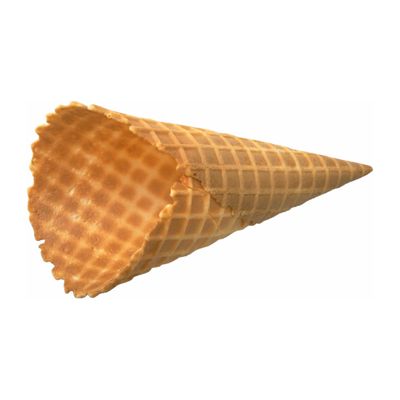From Longman Dictionary of Contemporary Englishconecone1 /kəʊn $ koʊn/ ●○○ noun [countable] 1 HMa solid or hollow shape that is round at one end, has sloping sides, and has a point at the other end, or something with this shape2 TTRan object shaped like a large cone that is put on a road to prevent cars from going somewhere or to warn drivers about something3 HBPDNthe fruit of a pine or fir tree → conifer4  DFa piece of thin cooked cake, shaped like a cone, that you put ice cream in, or a cone like this with ice cream in it5 technical a cell in your eye that is shaped like a cone, that helps you see light and colour → rod
DFa piece of thin cooked cake, shaped like a cone, that you put ice cream in, or a cone like this with ice cream in it5 technical a cell in your eye that is shaped like a cone, that helps you see light and colour → rod
 DFa piece of thin cooked cake, shaped like a cone, that you put ice cream in, or a cone like this with ice cream in it5 technical a cell in your eye that is shaped like a cone, that helps you see light and colour → rod
DFa piece of thin cooked cake, shaped like a cone, that you put ice cream in, or a cone like this with ice cream in it5 technical a cell in your eye that is shaped like a cone, that helps you see light and colour → rodExamples from the Corpus
cone• The family of light cones at all the points may be regarded as part of the Minkowskian geometry of space-time.• Remember how they used to give you roasted chestnuts in a little cone of newspaper?• Its massive cone rose five thousand feet above the Bahdu plain and a chain of foothills stretched south-west parallel with the Awash.• Botany yarns and cotton yarns are dry spun and waxed on cone.• Spray wax is easy to use, just spray the ball or cone lightly.• He pulled up, climbed out, and removed the plastic cone that had kept the space free.• Lower down and a little to the left rose the slimmer, more pointed cone of a second, subsidiary volcano.• These spatter cones contain little, if any, fine-grained ashy material and are amongst the most characteristic products of Hawaiian eruptions.• He walked further into the hall, shifting the cone of yellow light.• a volcanic coneconecone2 verb → cone something ↔ off→ See Verb tableOrigin cone (1400-1500) French Latin conus, from Greek konos 
